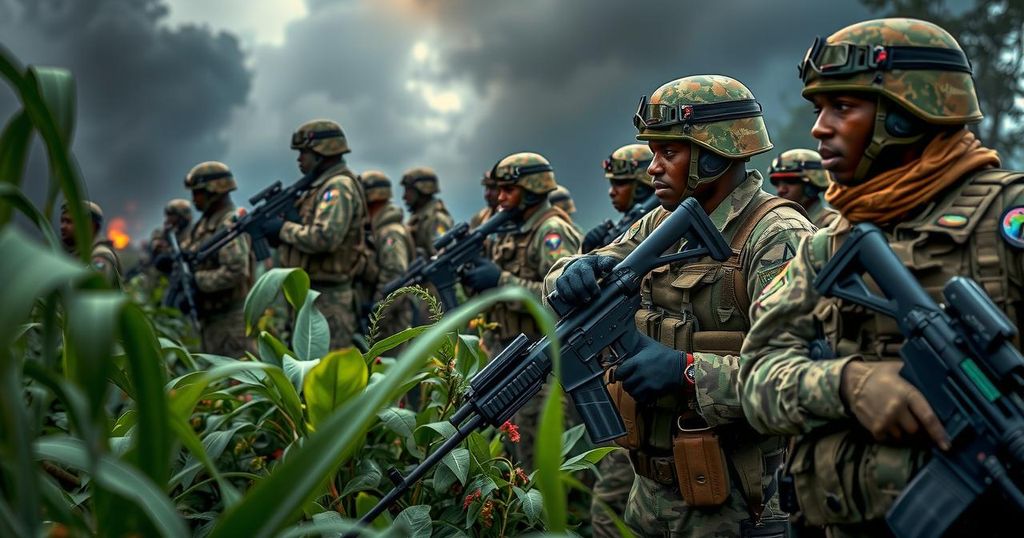Human Rights Watch (HRW) has reported on serious civilian atrocities in the eastern DRC involving Rwandan forces and the M23 rebel group. The report details acts of violence, including indiscriminate attacks and sexual violence against civilians amidst ongoing military confrontations. HRW calls for comprehensive investigations into these acts, protection of civilian rights, and urgent humanitarian assistance in affected areas.
Human Rights Watch (HRW) published a report detailing severe civilian atrocities in the eastern Democratic Republic of the Congo (DRC), attributing much of the violence to the ongoing hostilities involving Rwandan military forces and the M23 rebel group. The humanitarian crisis intensifies as these forces advance towards the town of Sake, placing local populations and over half a million internally displaced persons in grave danger of violence and further dislocation. The M23, predominantly composed of Tutsi fighters and reportedly supported by Rwanda, has resumed its insurgency since 2021. This group has been implicated in numerous violations against civilians, including indiscriminate assaults, sexual violence, and the coerced recruitment of minors as combatants. The ongoing conflict in North Kivu has escalated these incidents, particularly in displacement camps near Goma, turning them into scenes of violence. The Shabindu-Kashaka displacement site in North Kivu has experienced significant devastation due to the conflict. Recent rocket attacks attributed to Rwandan forces and the M23 have caused the death of a 19-year-old and led to the destruction of numerous shelters. Additionally, on May 3, rocket fire targeted the nearby Lac Vert and Mugunga neighborhoods, resulting in at least 17 civilian fatalities, including the tragic loss of 15 children. HRW’s report raises alarms about the deteriorating humanitarian conditions at the Kanyaruchinya camp, where evidence points to the unlawful detention and extortion of individuals by Wazalendo fighters. Detainees have recounted their harrowing experiences of violence and abuse, often in makeshift holding areas known informally as “kiboro.” Reports of sexual violence in these camps indicate alarming rates of 50 to 100 cases weekly, heightening the urgency for protective interventions. Such acts are recognized as war crimes under international law. The actions highlighted in HRW’s report may represent serious violations of international humanitarian law, particularly the Fourth Geneva Convention, which aims to protect civilians amid armed conflicts. Unlawful detentions and extortion also fall under the Rome Statute’s definitions of war crimes. HRW has called upon both Congolese and Rwandan authorities to conduct thorough investigations and hold accountable those responsible for war crimes, particularly regarding sexual violence, emphasizing the importance of command responsibility. Moreover, HRW advocates for comprehensive provisions of humanitarian assistance for all civilians at risk, including legal, medical, and social support for survivors of sexual violence. To better protect civilians from the effects of explosive weapons, HRW urges both nations to ratify the 2022 Political Declaration aimed at safeguarding citizens from humanitarian consequences arising during military operations. Lastly, the organization emphasizes the need for close monitoring by international bodies, such as the UN and EU, to ensure military support does not perpetuate human rights abuses.
The eastern Democratic Republic of the Congo (DRC) has been a hotspot for conflict, particularly involving militia groups like the M23, which has been accused of grave human rights violations since its resurgence in 2021. The region is compounded by the involvement of foreign military forces, specifically from Rwanda, which has been alleged to support these rebel factions. Consequently, the DRC suffers from significant humanitarian crises, leading to displacement and vulnerability among the local populations, especially in provinces such as North Kivu.
In summary, the report by Human Rights Watch paints a dire picture of the situation in the eastern DRC, where Rwandan forces and the M23 rebel group have committed numerous civilian atrocities amid increasing conflict. The urgent need for on-ground investigations, humanitarian assistance, and the enforcement of international humanitarian law is critical to preventing further violations and supporting the affected populations. Continuous monitoring by global institutions is essential to ensure accountability and protection for vulnerable communities.
Original Source: www.jurist.org






